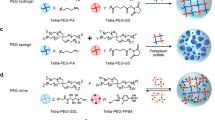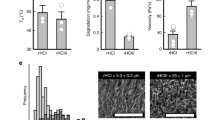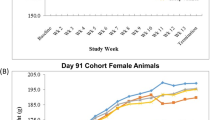Abstract
Gene therapy with viral vectors has progressed to clinical trials. However, the localization of viral vector delivery to diseased target sites remains a challenge. We tested the hypothesis that an adenoviral vector could be successfully delivered by complexation with a specific antibody that is bound to a biodegradable matrix designed for achieving localized gene transduction. We report the first successful delivery system based upon antibody immobilization of virions in a type I collagen-avidin gel using a polyclonal biotinylated IgG specific for the adenovirus hexon. In vitro stability studies demonstrated retention of viral vector activity with antibody-complexed adenovirus collagen gel preparations, in comparison to loss of vector activity from collagen gels prepared with nonspecific biotinylated IgG. Cell culture investigations using this antibody-controlled release system for adenoviral vector transduction of rat aortic smooth muscle cells (A10) demonstrated a significantly more localized reporter expression (β-galactosidase) compared with non-antibody-complexed controls. Herpes simplex thymidine kinase (HSVtk) adenoviral vectors were immobilized on avidin-collagen gels via this antibody-complexation approach, and ganciclovir was added to rat smooth muscle cells (A10) in culture with the gels. With complexed HSVtk adenovirus, only cells either in contact with the virus-containing gel or within 50 μm were killed. By comparison, at the same adenovirus and ganciclovir dose, non-antibody-complexed HSVtk adenoviral delivery with ganciclovir resulted in the death of virtually all cells. Myocardial gene transfer studies in pigs demonstrated significantly more efficient right ventricular adenoviral GFP expression with anti-hexon antibody-complexed matrix injections, compared with direct vector injections. Thus, our results show that matrix formulations based on antibody-complexation delivery of adenovirus resulted in site-specific localization of transgene expression that enhances the efficiency of therapeutic vector strategies and provides a potent means for localization, to avoid distal side-effects. This approach has therapeutic potential as an implantable preparation that through the means of antibody-complexation, can localize and optimize viral vector gene therapy.
This is a preview of subscription content, access via your institution
Access options
Subscribe to this journal
Receive 12 print issues and online access
$259.00 per year
only $21.58 per issue
Buy this article
- Purchase on Springer Link
- Instant access to full article PDF
Prices may be subject to local taxes which are calculated during checkout





Similar content being viewed by others
References
Nguyen DM et al. Gene therapy for lung cancer: enhancement of tumor suppression by a combination of sequential systemic cisplatin and adenovirus-mediated p53 gene transfer J Thorac Cardiovasc Surg 1996 112: 1372–1377
Rosenecker J et al. Adenovirus infection in cystic fibrosis patients: implications for the use of adenoviral vectors for gene transfer Infection 1996 24: 5–8
Raper SE et al. Developing adenoviral-mediated in vivo gene therapy for ornithine transcarbamylase deficiency J Inherit Metab Dis 1998 21 (Suppl. 1): 119–137
Sterman DH, Kaiser LR, Albelda SM . Gene therapy for malignant pleural mesothelioma Hematol Oncol Clin North Am 1998 12: 553–568
Knoell DL, Yiu IM . Human gene therapy for heriditary diseases: a review of trials Am J Health-Syst Pharm 1998 55: 899–904
Herman JR et al. In situ gene therapy for adenocarcinoma of the prostate: a phase I clinical trial Hum Gene Ther 1999 10: 1239–1249
Habib NA, Hodgson HJ, Lemoine N, Pignatelli M . A phase I/II study of hepatic artery infusion with wtp53-CMV-Ad in metastatic malignant liver tumors Hum Gene Ther 1999 10: 2019–2034
Stewart AK et al. Adenovector-mediated gene delivery of interleukin-2 in metastatic breast cancer and melanoma: results of a phase 1 clinical trial Gene Therapy 1999 6: 350–363
Langer R . New methods of drug delivery Science 1990 249: 1527–1533
Langer R . Drug delivery and targeting Nature 1998 392: 5–10
Bartus RT, Tracy MA, Emerich DF, Zale SE . Sustained delivery of proteins for novel therapeutic agents Science 1998 281: 1161–1162
Edelman ER, Nugent MA, Karnovsky MJ . Perivascular and intravenous administration of basic fibroblast growth factor: vascular and solid organ deposition Proc Natl Acad Sci USA 1993 90: 1513–1517
Langer R, Folkman J . Polymers for the sustained release of proteins and other macromolecules Nature 1976 263: 797–800
Petka WA et al. Reversible hydrogels from self-assembling artificial proteins Science 1998 281: 389–392
Spitz IM, Chertin B, Lindenberg T, Farkas A . Long-acting gonadatropin-releasing hormone implant to maintain medical castration for two years in men with prostate cancer New Engl J Med 1999 340: 1439
Simons M et al. Antisense c-myb oligonucleotides inhibit intimal arterial smooth muscle cell accumulation in vivo Nature 1992 359: 67–70
Simons M, Edelman ER, Rosenberg RD . Antisense proliferating cell nuclear antigen oligonucleotides inhibit intimal hyperplasia in a rat carotide artery injury model J Clin Invest 1994 93: 2351–2356
Sirois MG, Simons M, Edelman ER . Antisense oligonucleotide inhibition of PDGFR-beta receptor subunit expression directs suppression of intimal thickening Circulation 1997 95: 669–676
Mann MJ et al. Pressure-mediated aligonucleotide transfection of rat and human cardiovascular tissues Proc Natl Acad Sci USA 1999 96: 6411–6416
Villa AE et al. Effects of antisense c-myb oligonucleotides on vascular smooth muscle cell proliferation and response to vessel wall injury Circ Res 1995 76: 505–513
Bonadio J, Smiley E, Patil P, Goldstein S . Localized direct plasmid gene delivery in vivo: prolonged therapy results in reproducible tissue regeneration Nat Med 1999 5: 753–759
Labhasetwar V et al. A DNA controlled-release coating for gene transfer: transfection in skeletal and cardiac muscle J Pharm Sci 1998 87: 1347–1350
Labhasetwar V et al. Gene transfection using biodegradable nanospheres: results in tissue culture and a rat osteotomy model. Coll Surf B Biointerf 1999 16: 281–290
Roy K, Mao HQ, Huang SK, Leong KW . Oral gene delivery with chitosan–DNA nanoparticles generates immunologic protection in a murine model of peanut allergy Nat Med 1999 5: 387–391
Shea LD, Smiley E, Bonadio J, Mooney DJ . DNA delivery from polymer matrices for tissue engineering Nat Biotechnol 1999 17: 551–554
Beer SJ et al. Poly (lactic-glycolic) acid copolymer encapsulation of recombinant adenovirus reduces immunogenicity in vivo Gene Therapy 1998 5: 740–746
Kalyanasundaram S et al. Coacervate microspheres as carriers of recombinant adenoviruses Cancer Gene Ther 1999 6: 107–112
Sintov A, Ankol S, Levy DP, Rubinstein A . Enzymatic cleavage of disaccharide side groups in insoluble synthetic polymers: a new method for specific delivery of drugs to the colon Biomaterials 1993 14: 483–490
van Dijk-Wolthius WN et al. A versatile method for the conjugation of proteins and peptides to poly[2-(dimethylamino)ethyl methacrylate] Bioconjug Chem 1999 10: 687–692
Song C et al. Antibody tethered adenovirus for stent-based vector delivery in pig coronaries Circulation 2000 102: (Suppl. II) 566
Degreve B, De Clercq E, Balzarini J . Bystander effect of purine nucleoside analogues in HSV-1 tk suicide gene therapy is superior to that of pyrimidine nucleoside analogues Gene Therapy 1999 6: 162–170
Kuriyama S et al. Cancer gene therapy with HSV-tk/GCV system depends on T-cell-mediated immune responses and causes apoptotic death of tumor cells in vivo Int J Cancer 1999 83: 374–380
Guzman RJ et al. In vivo suppression of injury-induced vascular smooth muscle cell accumulation using adenovirus-mediated transfer of the herpes simplex virus thymidine kinase gene Proc Natl Acad Sci USA 1994 91: 10732–10736
Chang MW et al. Adenovirus-mediated transfer of the herpes simplex virus thymidine kinase gene inhibits vascular smooth muscle cell proliferation and neointima formation following balloon angioplasty of the rat carotid artery Mol Med 1995 1: 172–181
Chandler LA et al. FGF2-targeted adenovirus encoding platelet derived growth factor-B enhances de noco tissue formation Mol Ther 2000 2: 153–160
Kohler K, Veide A . Uses of fusions of beta-galactosidase and peptides to proteins Meth Enzymol 1994 228: 627–640
Acknowledgements
The authors thank Ms Ginger Nicholson for her manuscript preparation efforts. This research was supported in part by a grant from the National Institutes of Health (HL 41663), a grant from the Cystic Fibrosis Foundation, and by The William J Rashkind Endowment of The Children's Hospital of Philadelphia.
Author information
Authors and Affiliations
Rights and permissions
About this article
Cite this article
Levy, R., Song, C., Tallapragada, S. et al. Localized adenovirus gene delivery using antiviral IgG complexation. Gene Ther 8, 659–667 (2001). https://doi.org/10.1038/sj.gt.3301452
Received:
Accepted:
Published:
Issue Date:
DOI: https://doi.org/10.1038/sj.gt.3301452
Keywords
This article is cited by
-
Local sustained delivery of oncolytic adenovirus with injectable alginate gel for cancer virotherapy
Gene Therapy (2013)
-
Engineering Biomaterial Systems to Enhance Viral Vector Gene Delivery
Molecular Therapy (2011)
-
Lentivirus Immobilization to Nanoparticles for Enhanced and Localized Delivery From Hydrogels
Molecular Therapy (2010)
-
Mechanism of Sustained Release of Vascular Endothelial Growth Factor in Accelerating Experimental Diabetic Healing
Journal of Investigative Dermatology (2009)
-
The status of gene vectors for the treatment of diabetes
Cell Biochemistry and Biophysics (2007)



